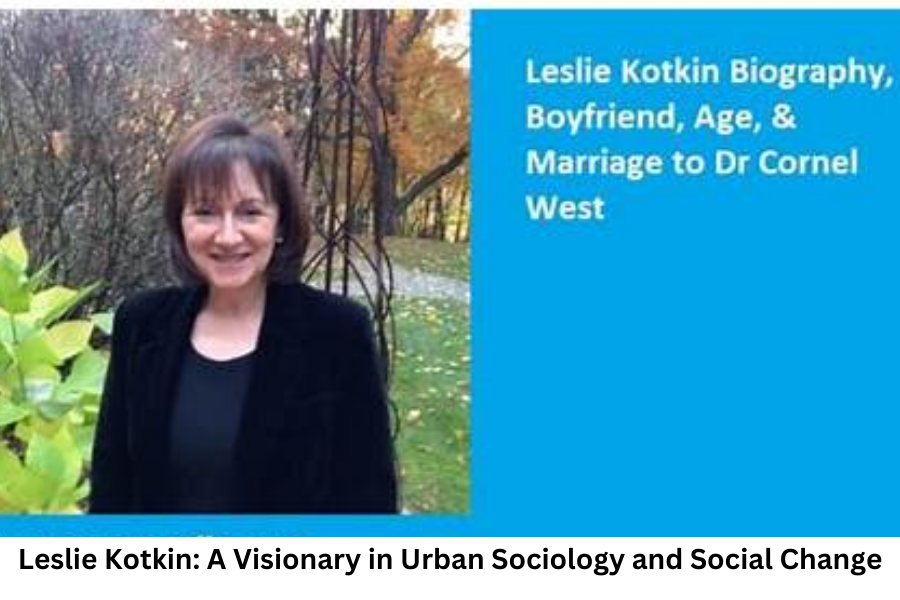Introduction
Leslie Kotkin is a prominent name in the field of urban sociology, known for her profound contributions to the study of cities, communities, and social structures. As an urban sociologist, Kotkin’s work explores how cities evolve, the factors that shape them, and the socioeconomic dynamics within them. Her unique perspective on urban development and the implications of social inequalities has positioned her as a leading voice in the field. Her research and publications have shed light on issues ranging from income disparity to the influence of technological advancement in shaping urban spaces.
Early Life and Education
Leslie Kotkin’s early life and academic journey laid the foundation for her career in urban sociology. Growing up with a keen interest in societal structures, she pursued a path that allowed her to understand how cities and communities operate at the core level. Kotkin attended prestigious universities where she studied urban studies, focusing her research on how cities can be designed and maintained in a way that promotes social justice and equity.
Her undergraduate studies were just the beginning. Leslie later earned her Master’s degree in urban sociology, where she honed her analytical skills and deepened her understanding of the complexities of urban environments. It was during this time that Kotkin began formulating the ideas and methodologies that would later define her career. Her passion for creating equitable, sustainable cities grew, and she started to realize the importance of applying her academic knowledge to real-world issues.
Wiki
| Attribute | Details |
| Full Name | Leslie Kotkin |
| Field | Urban Sociology |
| Known For | Research on urban development, social inequality, and technological impacts on cities |
| Education | Master’s degree in Urban Sociology |
| Key Areas of Research | Urban development, income inequality, social justice, technology in cities |
| Notable Publications | Urban Dynamics: The Social Impacts of City Development, Technology and the Future of Urban Living, Social Disparities in Urban Environments |
| Career Focus | Advocating for inclusive, equitable urban planning and social justice in city development |
| Influence | Urban planning, public policy, social equity, smart cities |
| Advocacy | Affordable housing, public transportation, equal access to resources |
| Key Themes | Technological advancements in cities, income disparity, social inclusion in urban environments |
| Public Engagement | Advocate for community-driven urban planning and participatory decision-making |
| Current Status | Active in academia and public discourse on urban issues |
The Foundation of Her Career
Leslie Kotkin’s career trajectory is a testament to her dedication to improving the state of urban life. Over the years, she has been involved in various research projects, collaborations with urban planners, and social initiatives that aim to address the disparities found in urban communities. Her work emphasizes how urbanization, technological innovation, and social inequality intertwine, creating challenges for policymakers and residents alike.
One of the key elements of Kotkin’s research is the relationship between urbanization and socioeconomic factors. She believes that the development of cities should not only focus on the physical growth and infrastructure of the area but also address the social aspects, such as income inequality and access to basic services. Her work pushes for the idea that cities need to be inclusive, ensuring that marginalized communities are not left behind in the process of urban development.
Contributions to Urban Sociology
Leslie Kotkin’s research spans a wide range of topics related to urban sociology. Her work explores the effects of income disparity, technological advancements, and shifting cultural norms on urban life. One of her most significant contributions has been her examination of the role of technology in shaping the future of cities. With the rise of smart cities and technological innovations, Kotkin’s work provides a critical lens through which we can assess whether these advancements truly benefit all segments of society.
In her publications, Kotkin discusses how technology can both help and hinder urban communities. On the one hand, technological tools have the potential to streamline services, improve accessibility, and create more sustainable urban environments. On the other hand, the rapid pace of technological growth can create a digital divide, leaving certain populations behind, especially those without access to modern technologies. Kotkin advocates for a balanced approach where technological advancements are designed to ensure inclusivity and address social disparities.
Another key area of Kotkin’s research is the role of income inequality in urban settings. She explores how wealth distribution influences access to education, healthcare, and housing, leading to deeper social divides within cities. Kotkin argues that addressing income inequality is essential for the overall well-being of urban communities. Her work calls for policies that promote equal access to opportunities and resources, ensuring that individuals in all socioeconomic brackets can thrive.
Urban Planning and Social Justice
Throughout her career, Leslie Kotkin has been a strong advocate for social justice in urban planning. She believes that urban spaces should be designed with the needs of all residents in mind, particularly those from disadvantaged backgrounds. Kotkin’s research highlights the importance of affordable housing, public transportation, and accessible healthcare in building cities that serve the diverse needs of their populations.
In her work, Kotkin often criticizes urban planning strategies that prioritize wealthier residents and upscale developments over the needs of marginalized groups. She argues that urban spaces should not simply be places for the wealthy to live and thrive, but should be designed with the intention of fostering community and reducing inequality. Kotkin pushes for urban planning that includes affordable housing projects, equitable distribution of resources, and policies that promote social inclusion.
One of Kotkin’s most notable works is her analysis of the link between urban sprawl and social inequality. As cities expand outward, new developments often push low-income communities to the outskirts, leaving them with fewer opportunities and limited access to essential services. Kotkin’s research shows that this type of urban development exacerbates social disparities and isolates vulnerable populations. She calls for more sustainable and inclusive development practices that bring people together and ensure that everyone has access to the resources and opportunities they need to succeed.
Influential Publications
Leslie Kotkin’s career is also marked by a series of influential publications that have made significant contributions to the field of urban sociology. Through her books, articles, and papers, she has helped redefine the way we think about cities, social inequality, and community engagement. Her work encourages a more nuanced understanding of the challenges that urban areas face and provides concrete suggestions for addressing them.
In her book Urban Dynamics: The Social Impacts of City Development, Kotkin examines how the physical and social development of cities can influence the lives of their residents. The book provides a detailed analysis of the complex relationship between urban development and social structures, highlighting the ways in which city planning can either exacerbate or reduce social inequalities. Through case studies and data analysis, Kotkin offers insights into how cities can be developed in ways that promote social equity and economic opportunity for all.
Another notable publication is Technology and the Future of Urban Living, in which Kotkin explores the intersection of technology and urban development. She looks at how technological innovations like smart cities, autonomous vehicles, and the Internet of Things are changing the way people live and interact in cities. Kotkin raises important questions about the role of technology in creating equitable urban spaces and emphasizes the need for careful planning and consideration of the social impacts of technological change.
Additionally, Kotkin’s work on Social Disparities in Urban Environments challenges readers to think critically about the ways in which economic and social inequalities manifest in urban areas. Through a combination of research, data analysis, and real-life examples, Kotkin sheds light on the systemic issues that contribute to poverty, housing instability, and lack of access to education and healthcare in urban centers.
The Intersection of Urban Sociology and Policy
Leslie Kotkin’s work has had a significant impact on urban policy and decision-making. Her research provides valuable insights that can help guide urban planners, policymakers, and government officials in making informed decisions about the future of cities. Kotkin’s emphasis on social justice and inclusivity has inspired many policy changes aimed at addressing inequality and promoting equitable development.
For instance, her advocacy for affordable housing has influenced policy discussions about the need for rent control, housing subsidies, and zoning reforms that allow for greater diversity in housing options. Kotkin’s work has also been influential in shaping discussions about transportation equity, calling for public transit systems that are accessible to all residents, regardless of income.
Moreover, Kotkin’s research on income inequality has inspired policies aimed at reducing the wealth gap in urban areas. By examining the impact of inequality on health, education, and overall quality of life, Kotkin has provided compelling arguments for policies that seek to reduce economic disparities and create more equal opportunities for all citizens.
The Role of Public Engagement in Urban Development
In addition to her scholarly work, Leslie Kotkin is also an advocate for public engagement in urban planning and development. She believes that the people who live in cities should have a voice in how their communities are shaped. Kotkin encourages participatory planning processes that involve residents in decision-making, ensuring that urban development reflects the needs and desires of those who are directly affected by it.
Through community forums, workshops, and public consultations, Kotkin advocates for greater transparency and inclusivity in urban planning. She believes that when residents are involved in the decision-making process, cities are more likely to develop in ways that promote social cohesion, economic opportunity, and environmental sustainability. Kotkin’s work emphasizes the importance of community-driven development and the need for cities to listen to the voices of their residents.
A Thought Leader in Urban Sociology
Leslie Kotkin has established herself as a thought leader in urban sociology, thanks to her insightful research and thought-provoking publications. Her work has contributed to a deeper understanding of the challenges facing modern cities and has provided a framework for addressing the complex issues of urbanization, inequality, and social justice. Through her research, Kotkin has demonstrated that cities can be powerful engines of social change, but only if they are built with equity, inclusivity, and sustainability in mind.
As urban areas continue to grow and evolve, Kotkin’s research remains highly relevant. Her work challenges us to think critically about the future of cities and the role that urban planners, policymakers, and residents can play in creating more just and equitable communities.
Conclusion
Leslie Kotkin’s contributions to the field of urban sociology have left an indelible mark on how we understand the complex dynamics of cities, social inequality, and urban development. Through her research, Kotkin has illuminated the challenges that cities face, particularly concerning income inequality, technological advancement, and the need for inclusive urban planning. Her work emphasizes the importance of designing cities that not only focus on physical growth but also foster equitable social structures that benefit all residents.
Kotkin’s commitment to social justice and her critical approach to urban planning have inspired many to reconsider how cities are developed, urging policymakers and urban planners to create spaces that promote opportunity and fairness for everyone. Her advocacy for affordable housing, access to education, and sustainable urban development continues to influence the discourse on urbanization today. Through her academic contributions and public engagement, Leslie Kotkin remains a key figure in the ongoing conversation about the future of cities and the role they play in shaping society.
FAQs
1. Who is Leslie Kotkin?
Leslie Kotkin is a prominent urban sociologist known for her research on the intersection of urban development, social inequality, and technological advancements. She has made significant contributions to the understanding of how cities evolve and how they can be designed to promote inclusivity and equity for all residents.
2. What are Leslie Kotkin’s main areas of research?
Kotkin’s research spans several important areas, including the impact of income inequality on urban life, the role of technology in shaping cities, and the importance of social justice in urban planning. Her work also explores how urbanization affects social structures and community engagement.
3. How has Leslie Kotkin contributed to urban planning?
Kotkin has influenced urban planning by advocating for more equitable and inclusive city development. She emphasizes the need for affordable housing, access to public services, and policies that address income disparity. Her research has led to a deeper understanding of how urban environments can be shaped to reduce social inequalities.
4. What are some of Leslie Kotkin’s notable publications?
Kotkin has authored several influential works, including Urban Dynamics: The Social Impacts of City Development, Technology and the Future of Urban Living, and Social Disparities in Urban Environments. These publications have contributed significantly to urban sociology and have provided frameworks for addressing key issues in modern cities.
5. What is Leslie Kotkin’s approach to urban technology?
Kotkin believes that while technology has the potential to improve urban living, it can also create new divides within society. Her approach advocates for using technology in a way that promotes inclusivity, ensuring that technological advancements benefit all residents, regardless of socioeconomic status.
6. What role did Leslie Kotkin’s work play in her marriage to Cornel West?
Leslie Kotkin and Cornel West, both intellectuals focused on social justice and equity, shared common values in their work. Their marriage brought together two prominent voices in the academic world, both committed to addressing inequality and promoting positive social change. However, their marriage ended in divorce in 2018.
7. Why is Leslie Kotkin important in the field of urban sociology?
Leslie Kotkin is important in urban sociology because of her critical examination of the ways urbanization, socioeconomic factors, and technological advances intersect. She has provided valuable insights into how cities can be developed in ways that are more socially inclusive, equitable, and sustainable, influencing both academic research and urban policy.
Get the latest scoop and updates on playhop




